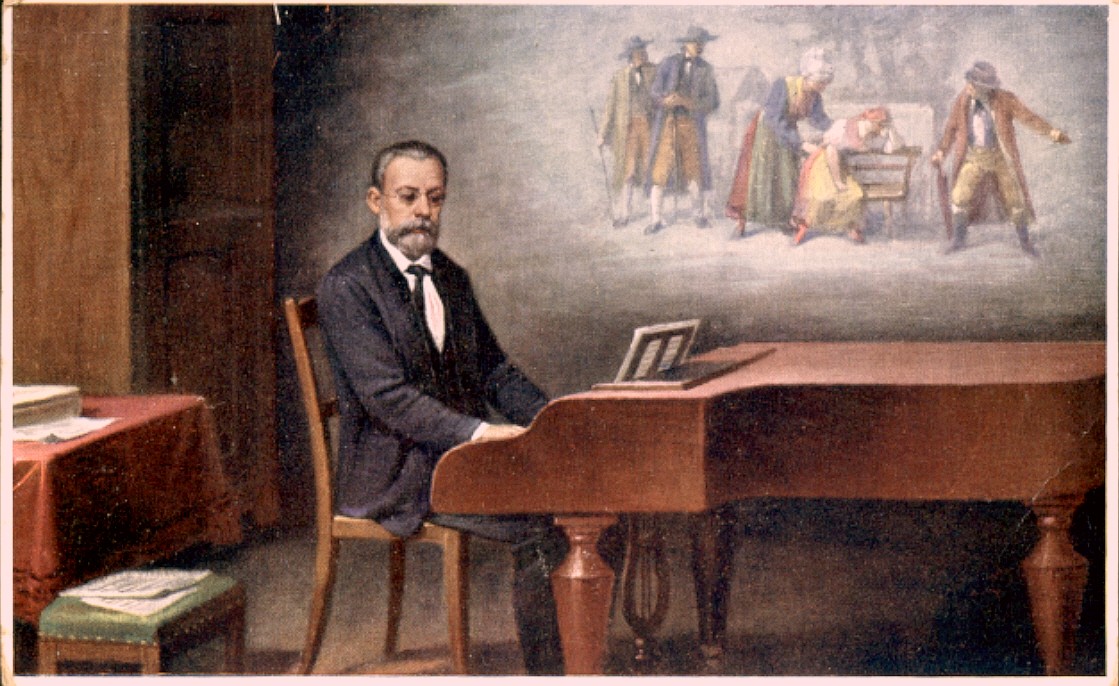Bedřich Smetana, a pivotal figure in Czech music, is celebrated for his contributions to the development of a national musical style. His works, often infused with Czech folk elements, showcase a remarkable blend of lyrical beauty and nationalistic pride. Here are ten of his most significant compositions that continue to resonate with audiences worldwide.
1. Má vlast (My Homeland)
One of Smetana’s most celebrated works, “Má vlast” is a cycle of six symphonic poems, each depicting a different aspect of the Czech homeland. The most famous of these is “Vltava” (The Moldau), which musically describes the course of the Vltava River through the Bohemian countryside. The entire cycle is a masterpiece of programmatic music and a cornerstone of Czech national identity.
2. The Bartered Bride (Prodaná nevěsta)
This comic opera is perhaps Smetana’s most well-known stage work. “The Bartered Bride” is a delightful blend of folk music and lively dances, telling the story of true love triumphing over economic interests. The overture and dances from the opera, such as the polka and furiant, are frequently performed as concert pieces.
3. String Quartet No. 1 in E minor, “From My Life”
Smetana’s first string quartet is a deeply personal work, reflecting his own life experiences, including his struggle with deafness. The quartet is notable for its dramatic narrative and emotive power, with the final movement featuring a high-pitched note symbolizing the ringing in his ears that heralded his hearing loss.
4. Piano Trio in G minor, Op. 15
Written in memory of his daughter, who died at a young age, the Piano Trio in G minor is one of Smetana’s most poignant compositions. The work combines elements of Czech folk music with an intense emotional depth, making it a standout piece in the Romantic piano trio repertoire.
5. Smetana’s Festive Symphony (Triumphal Symphony)
Composed in honor of the coronation of Emperor Franz Joseph I, this symphony is a vibrant and patriotic work. It showcases Smetana’s skill in orchestration and his ability to create stirring and majestic music, embodying the spirit of celebration and national pride.
6. Piano Sonata in G minor
Though lesser-known, Smetana’s Piano Sonata in G minor is a work of significant depth and complexity. The sonata exhibits his mastery of piano composition and his ability to blend lyrical melodies with virtuosic passages, making it a hidden gem in his oeuvre.
7. The Brandenburgers in Bohemia (Braniboři v Čechách)
This opera, set during the 13th-century invasion of Bohemia by the Brandenburgers, was Smetana’s first major success in the genre. It features a powerful combination of historical drama and nationalistic themes, with an energetic and stirring score that reflects the Czech spirit.
8. Dalibor
A tragic opera based on the legendary Czech knight Dalibor, this work explores themes of heroism, love, and sacrifice. While not as widely performed as “The Bartered Bride,” “Dalibor” is noted for its compelling narrative and rich musical textures.
9. Libuše
Composed for the opening of the National Theatre in Prague, “Libuše” is a grand opera celebrating Czech legend and national identity. The opera features the legendary prophetess Libuše, who foretells the glory of the Czech nation. The work is imbued with a sense of grandeur and historical significance.
10. Czech Dances for Piano
This collection of piano pieces showcases Smetana’s affection for Czech folk music and dance. The dances, including polkas, mazurkas, and others, are lively, rhythmic, and imbued with a distinctly Czech character. They offer a delightful glimpse into the folk traditions that inspired Smetana’s work.
Conclusion
Bedřich Smetana’s compositions are a testament to his genius and his deep connection to Czech culture. His music, characterized by its lyricism, emotional depth, and nationalistic fervor, continues to inspire and captivate audiences around the world. Whether through the sweeping landscapes of “Má vlast” or the heartfelt melodies of his chamber music, Smetana’s legacy remains a vibrant part of the classical music canon.


Comments are closed